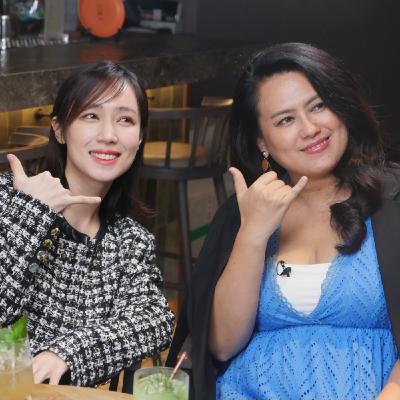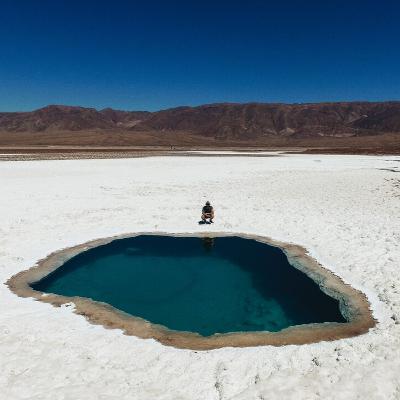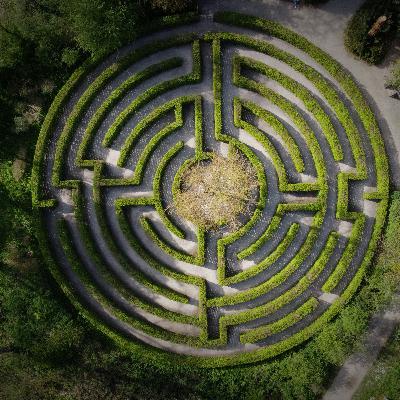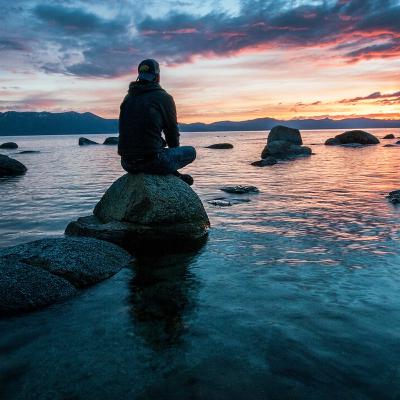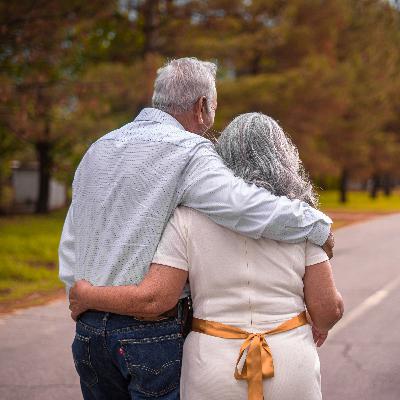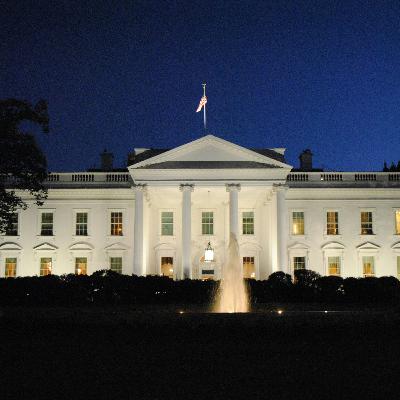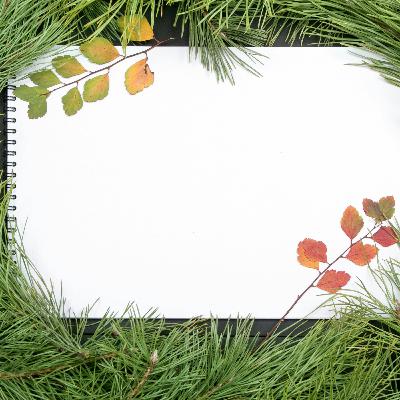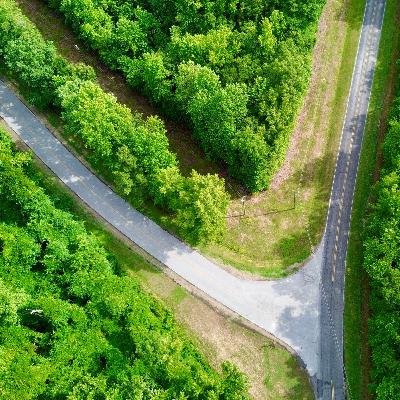Discover The Gist
The Gist

The Gist
Author: kal
Subscribed: 0Played: 1Subscribe
Share
© kal
Description
The Gist is a podcast from happen.world that aims to give you the gist of interesting ideas about life, the universe and everything!
happen.substack.com
happen.substack.com
108 Episodes
Reverse
To everything there is a season, the saying goes. And here in many parts of North America, we are in the midst of my favourite one - autumn. To me, it is a season that brings together the best of the other three. There is a hint of lingering summer heat tempered by cooler breezes. Some days feel like spring with fresh rains and some green still left in the leaves. And as the trees start turning into shades of red and auburn, they remind us that autumn is keeping the winter snow at bay a little longer.Fall also signals a time of change. For garden lovers, it's a time to close off our flower beds, wrap our evergreens in burlap blankets, and plant bulbs for the spring season. As an amateur gardener with mostly a brown thumb, I always admire the bountiful gardens of my friends and neighbours. and professionally landscaped botanicals with sprawling year round blooms and weed free beds.But in a world so focused on outward curated perfection - perfect houses and lawns, perfect bodies and clothes, indeed perfect lives whatever that means to each of us - I have come to terms with my messy garden. In fact it has become a source of solace and joy, a place where I get to putter, to experiment, to try things with imperfect knowledge, and to learn by trial and error. A forgiving place where flowers and vegetables sometimes bloom in spite of my ignorance. A reminder that life is inherently messy and surprising despite our best attempts to control it.See full transcript here.Photo credit: Merlin's Hollow
This week marks the official start of autumn in the Northern Hemisphere. My thoughts always turn to the school year as children are settling into new grades and routines in most North American cities.When the pandemic was first declared, no one could have imagined that the vast majority of the world's children would not be in school, atleast not in person. Technology, helped millions of children through online learning, with all its benefits and pitfalls. Now, five years on, everyone from scientists and pediatricians, to educators and policy makers, will no doubt keep reflecting on the impact of the pandemic on education. It makes one wonder about education as a whole, what it means to learn and how that has changed over human history.See full transcript on Substack or LinkedInPhoto credit: Element5Digital
Last time, in Part 1 of this topic, we looked at how the remote versus in-person work debate is unfolding in different countries. Global trends aside, each of us must grapple with these questions individually. This debate rages on as we all try to navigate the ever changing waters of the workplace. Everywhere, people are wondering if remote work is here to stay or if it will be a relic of the pandemic?For some of us its a moot point because certain front line jobs simply don't lend themselves to working from home. For the rest of us who do have the privilege of choice, it comes down to preference, perception and what we want to get out of work. See full transcript including articles mentioned in this episode by clicking our blog link here.Photo credit: Alexa Williams
After Covid bans started lifting a couple of years ago and some of us were going back to work in person, we shared a two-part update on global trends and individual choices we were making in returning to the office. Today, the debate continues as employees and employers grapple with the right balance, so this topic remains timely. We are revisiting it, since for many of us September is a month of transition. Children are returning to school and adults are resuming a regular work schedule. But a few years into a post-pandemic world, what does showing up for work really mean?See full transcript here.Photo Credit: Nick Morrison
It is very easy to get wrapped up in everything we need to do day to day. When we feel busy or overwhelmed it is natural to vent to people who lend an empathetic ear. Whether that is having too much on our plates. Or a difficult person or situation we might be dealing with.Whatever the problem, most of us find it comforting to have a calm presence to turn to - a caring spouse, a trusted colleague or a patient friend who is happy to let us get things off our chest or maybe offer a different perspective. I think of such people as an oasis, not just in times of crisis, but in the day to day business of living life, with its inherent ups and downs.It doesn't hurt to reflect on how we can be that nurturing presence to others. If we want to build a more compassionate world with greater mutual understanding, there is no better place to start than with ourselves. Certainly we can all show kindness through outward acts. This could mean volunteering our time in local communities. Or donating to charities that have global reach. It may be through work that helps others or helps the planet as a whole. But surprisingly what is often harder than these outward acts, is sustaining an inner equilibrium while we deal with smaller, everyday things in life. So how can we train ourselves to maintain presence? How can we be an oasis for others? Here are a few ideas. See full transcript here.Photo credit: Benjamín Gremler
Although the Covid pandemic has thankfully passed, we continue to learn a lot about its toll on virtually every country around the world. The pandemic came with a shared sense of helplessness and fear. It shone a light on mental health as anxiety levels spiked. But even before Covid, anxiety was on the rise, and many people will continue to struggle with it in the future.Of course, anxiety is a spectrum, with those on the mild end experiencing it in passing, and those on the severe end being debilitated by it. Until recently, doctors and therapists relied on tools such as medications and cognitive behavioural therapy (CBT) to help patients manage anxiety. This was the case for Dr. Jud Brewer, a psychiatrist and neuroscience researcher at Yale and Brown universities, who uses these tools in his own practice. But he has also successfully incorporated mindfulness into his work. See full transcript here. See full transcript here.Photo credit: Ben Mathis Seibel
If we were to look back in time a few centuries, we would see that so called “commoners” were going about their lives knowing they had little chance of joining the aristocratic classes. We have come a long way since then. Though socioeconomic barriers and inequalities persist, we now aspire to a world where anyone, with enough grit and talent, can become anything they set their mind to.This message is central to our increasingly meritocratic societies the world over. It has its benefits and has provided tremendous opportunity where in the past there would have been oppression. More people can fulfill their potential and work their way towards a better quality of life. But is this core tenet of meritocracy true and what does it take, individually and collectively, to make it true? How has it shaped our notions of personal success and failure? See full transcript here.Photo credit: Florian Schmetz
The idea of mindfulness, and related practices like yoga and meditation, has become more mainstream in recent years. From boardrooms to classrooms, sports fields to hospitals, the notion of working with our minds is not so foreign anymore. And yet translating these ideas into consistent action is where many of us get stuck.If we are honest, we are often better at reading articles, listening to podcasts or watching videos on these topics, than we are at making time to be alone with our thoughts. So what holds us back from doing the hard work of actively taking care of our minds? See full transcript here.Photo Credit: Keegan Houser
Whether we like it or not, life is full of change, both in the world around us and within our own lives. Most of us have a love hate relationship with change. We crave novelty, but too much change, too often can also feel de-stabilizing. With so much political, economic and environmental turmoil in the world right now, how can we maintain inner stability? How do we stay centered day to day, when it feels like the ground is always moving?Photo Credit: Harry Cunnigham
We all know the power of good stories and we humans seem wired to build our lives around them. Throughout our history, our species has relied on oral tradition to share information, pass down knowledge and teach morality through myths and legends.And every day each of us is writing our own stories. Our brains like to weave narratives out of daily events and fit them into a bigger storyline, in an attempt to make sense of life.The trouble is, we also like stories to be tidy, for protagonists to solve their problems, for endings to offer a sense of closure. But the variability of real life means that many things remain unresolved. See full transcript here.Photo credit: Kalen Emsly
It's safe to say that without a crystal ball, none of us know for sure how long our lives will be. Hence the expression, life is short, because in many ways it is indeed quite fleeting. Yet for some, life can also be long. Could we all embrace the secrets of people in the world who have lived the longest and healthiest lives? Maybe some of us dread living until a 100, because we imagine ourselves to be frail, bed ridden or not in control of our faculties.But what if we could lead active lives into our triple digits, full of warmth, connection, laughter and best of all, a sharp mind. Sounds pretty good, doesn't it? Well, that's exactly what many of the centenarians in the so called 'Blue Zones' are doing. These zones are areas of the world that seem to consistently have the highest concentration of people living into their nineties or past one hundred.See full transcript here.Photo credit: Hector Reyes
With Donald Trump on the cusp of taking the presidential oath - again - there is no end of analysis about why or how this could have happened. And certainly enough finger pointing and blame to go around. Plenty has been written about broader culpability, but we are where we are, so perhaps it is better to look at why our societies willingly give personalities like Trump so much power and credence.
After all, without his cadre of enablers, the narcissist-in-chief would not be able to move his agenda forward. And therein lies both the problem and the solution - narcissists and all manner of other antagonistic personalities are only as powerful as the attention and control we collectively allow them to have. See full transcript here.
Photo credit: Tabrez Sayed
We are ushering in a new year, fresh with possibilities. Around the world, leaders are changing hands, for better or for worse. With change, also comes uncertainty and sometimes the revival of old wounds or long standing grudges.
As U.S. President, Joe Biden, despite all his known faults, prepares to leave office, it's safe to say that he was clearly a different kind of leader than his predecessor. Specifically in terms of the civility he brought to the job. Despite myriad crises and so much acrimony, Biden continues to speak of healing and somehow manages to remain positive. That's possibly despite, or perhaps because of, the great personal tragedies he has endured.
It's also possible that a remarkably long political career, rather than making him cynical, has seasoned and humbled him, allowing him to let go of grudges and reach across party lines to do what needs to be done. Someone who might otherwise have settled into a quieter life, made one last attempt to re-imagine his country as it could be.
With his predecessor set to return to office once again, history books may yet write of Biden's naivete and misplaced faith in bipartisanship. But he has done one thing that is likely to be remembered, regardless of what his legacy becomes — he has set a tone at the top that demonstrates a belief in the value of empathy and civil discourse. A tone that is likely to take a sharp turn upon his exit.
Whether in politics, business or other aspects of life, kindness, while applauded in theory, is sometimes seen as weakness in practice. In a world that often rewards power and aggression, where do warmth and decency fit in? Does it make sense to take the high road, turn the other cheek— let bygones be bygones?
See full transcript here
Photo credit: Kostiantyn-Li
Right now in the Northern Hemisphere most of us are in the midst of a change of season. The hot days of summer days, along with school holidays and vacation travel, are behind us. We are in the thick of autumn, refocused on work, school routines, or personal projects. And already, there are hints of cooler weather, with winter just around the corner.
Each time the seasons change, we can take a cue from nature to reflect on how life is ever changing. Transitions, whether seasonal, personal or professional, can come with mixed emotions. By embracing seasonal living, we can welcome change into our lives and the full range of emotions that come with it. See full transcript here.
Photo Credit: Johannes Plenio
The pandemic has forced many of us to reflect on our lifestyles - both at home and at work. It is wonderful that we are thinking more carefully about where and how we work. But a recent Economist article urges us to go even further and pay attention to what actually constitutes work. Should sitting in meetings and responding to emails be considered work? Undoubtedly both are a necessary part of modern work. But we are all guilty of booking too many meetings and sending too many emails.
It is important to challenge these kinds of habitual behaviours. Can the content of an email be handled through a group chat or people collaborating in a shared document? Can a meeting be 15 minutes forcing all parties to get to the point? Changing these behaviours also creates time for two very important elements of life -first, deep work and second, boredom. See full transcript here.
Photo credit: Annie Spratt
The beloved Canadian literary character, Anne of Green Gables, famously said 'I'm so glad to live in a world where there are Octobers'. I for one agree with Anne. October is a wonderful month, an in-between time where the cooler fall air means wearing cozy sweaters, drinking hot cocoa and sitting by the fire watching the leaves change colour. But the best part of October, for kids and adults alike, might just be Halloween. An opportunity to dress up and be someone else for a day. I was reminded of this just last week with all the neighbourhood children, along with mine, out in droves in their costumes.
I've written before about how children relish in the opportunity to embody different characters on Halloween or through make belief and storytelling. But really, don't we already play many different roles throughout our lives as adults? Even in a given day we are many different people depending on where we are and who we are with. During Covid, some of these lines between our different roles started to blur - work and home, formality and leisure. Maybe that has contributed to the notion of bringing more of our private selves into the public realm, even into the workplace. So as we say goodbye to October and usher in a new month, it's helpful to reflect on what an authentic self really means, if it exists at all in a consistent way or if it is ever changing.
See full transcript here.
Photo credit: Paige Cody
While decision making on a large scale has been studied extensively - as it applies to leadership, business, policy development - we often don't apply much rigor to decisions in our individual lives. Most of us don't formally learn decision making. We pick it up indirectly by watching our elders or leaders and through our own life experience. By trial and error, by making mistakes and gradually (hopefully!) making better decisions as we mature.
But what if we viewed decision making as a key life skill, approaching each decision more systematically, not reactively? Would this make the process less fraught with stress? Could we better prepare our children by delegating responsibility earlier, not hovering as much, and letting them build their decision-making muscle?
An important first step is to realize that not all decisions are equal. We face a range of decisions in life. Small versus large transformative decisions differ in size, but sometimes little recurring choices made consistently - like what we eat, how active we are - can have as much long term impact as more major life decisions like who to marry, where to live or what career to follow.
At times we face simple choices where no matter what we pick we won't go wrong. But at other times, decisions can be complex with high stakes and present both opportunities and consequences. Here we can preserve our mental resources by making the simpler decisions quickly and investing more time in careful, deliberate analysis of the riskier ones. Too often we spend too long on simple matters leaving us drained and unable to deal with bigger decisions.
Easy decisions are easy because there is a clear best option. But when we have multiple options that may be equally good or bad with no clear criteria to help us decide, that can feel much harder. In the case of these hard choices we must, as philosopher Ruth Chang says, dig deep, develop our own criteria and select a path based on what we value most at the time.
Having assessed what type of decision we are facing, the next step is to go about making a decision with as much clarity of mind as we can muster. Here are a few ideas that might help us all with that process…
See full transcript here.
Photo Credit: Cody Moore
While almost all animals have unique ways of communicating, the development of complex, language-based communication sets humans apart. It allows us to express ourselves through speech and the written word. With inventions ranging from paper to computers and smartphones, the capacity and reach of human communication continues to grow. And yet it is as fraught with potential for misunderstanding and harm, as it is for positivity and change.
Most of us take this incredible human ability for granted. Children are naturally wired to pick up multiple languages almost effortlessly. And as adults we often don't spend enough time thinking about the importance of language. But who would we be as a species and as individuals without words? See full transcript here.
Photo credit: Chris Montgomery
While going through the self check-out recently, I witnessed what is, no doubt, a common grocery store event - a spectacular, full-bodied toddler meltdown. The drama, the tears, the anger - an overreaction to something seemingly small, but very real and relevant to the child. How we respond to a distressed child has a direct impact on its behaviour. While our first instinct might be to lecture or discipline, we all know that kindness and understanding generally work better. Helping the child to breathe and relax goes a long way towards its ability to self-soothe in the future.
But let's be honest, emotional self-regulation isn't just hard for toddlers - many of us struggle with it throughout our adult lives. How often are we standing at the self check-out feeling tired, frazzled, or overwhelmed? How often do we take the time to do a self check-in? To breathe and take a moment to center ourselves. Here are some simple yet effective things we can do to embrace the relaxed way of life we might be craving. See full transcript here.
Photo credit: Faye Cornish
It may be true that some periods of life are genuinely more intense than others. And that may be the case whether you are a single person in your twenties, or middle-aged with family responsibilities, or a retiree! At any stage of life there are times when there really is a lot going on all at once. After all, how often do we hear the phrase "I'm crazy busy"? It seems to have become the norm, and unfortunately even a badge of honor. Often we feel surrounded by busyness through the hustle and bustle at our workplaces, in the congestion of traffic or even in the noise and chaos of our households.
But what if busyness is also a feeling we carry around? If we take some time to examine our thoughts and emotions, it becomes clear that our sense of busyness is biased by our internal state. Some days, there could be a whirlwind of activity, but we somehow handle it all in zen-like fashion. Other days might be lighter with just a few to dos on our list, but we feel frantic, overwhelmed, or unsure of how we will get through the day. So what's going on? See full transcript here.
Photo Credit: Mauro Mora





